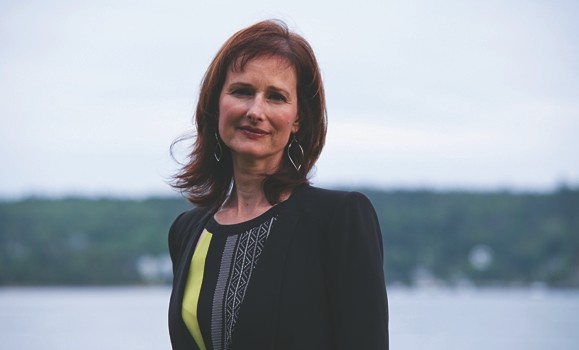This story was first published in the .
I had a lot of fun figuring out what a bog would do to a body,вҖқ says Pamela Callow (LLBвҖҷ91, MPAвҖҷ94) with a laugh. вҖңThe experts I consulted were intrigued as well.вҖқ
ItвҖҷs a surprising question for a lawyer turned public policy consultant to be researching вҖ” but less surprising for a public policy consultant turned novelist.
Callow has written three mystery novels and while the connection to her legal background is evident, sheвҖҷs just as proud of the public policy issues sheвҖҷs explored in her books: the regulation of bio-medical devices, the experiences of the wrongly accused and the right to die movement. They are issues informed by her education in law and public administration, featured in books that benefit from the research skills she developed as a student, lawyer and consultant.
вҖңIвҖҷm very focused and disciplined when I write,вҖқ she says. вҖңI think anyone who pursues an advanced degree has to have those skills.вҖқ
Callow calls herself an вҖңaccidental thriller writer.вҖқ It was the early 2000s. She had been working as a freelance consultant after the Halifax office of her former employer, Accenture, closed. With two small children at home, though, juggling intense work assignments and family life was proving challenging.
She decided to take time away from work until her girls reached school age, thinking as well that this would be a good opportunity to give her dream of becoming a novelist a shot. She signed up for writing courses and started deconstructing novels she liked, charting their plot points and character development.
Halifax setting
Her first attempt was a heavily researched historical novel. While there was some interest from publishers, no one committed to signing her on. вҖңCan you write something else?вҖқ asked an editor who liked her writing but didnвҖҷt feel the manuscript was a fit for her publisher. Callow said yes, and lawyer Kate Lange was born.
While the rejections were difficult (CallowвҖҷs first novel remains unpublished), вҖңI almost feel badly for people who are successful right out of the gate,вҖқ she says. вҖңYou need the rejection and the critiques to make you a better writer and to thicken your skin.вҖқ
 Her current agent first rejected her вҖ” with a form letter вҖ” before taking her on based on her first published novel, Damaged. вҖңIf your book does get published, eventually it will be out there being judged by everyone, so you need to be able to handle rejection and criticism.вҖқ
Her current agent first rejected her вҖ” with a form letter вҖ” before taking her on based on her first published novel, Damaged. вҖңIf your book does get published, eventually it will be out there being judged by everyone, so you need to be able to handle rejection and criticism.вҖқ
Damaged was followed by Indefensible and Tattooed. Callow is proud to have convinced her editors to let her set her books in Halifax, when the temptation might have been to locate them in an anonymous American coastal city. вҖңOne publisher rejected Damaged because it was set in Halifax вҖ” but then approached me after the book came out to see if IвҖҷd sign with them.вҖқ
But why the decision to rename В鶹ҙ«ГҪ as Hollis University? вҖңI get asked that a lot!вҖқ she says. вҖңI struggled with it, but decided to change the name because thereвҖҷs a university researcher in the first book who does something unethical, and I didnвҖҷt want to denigrate Dal because I know how ethical DalвҖҷs researchers are.вҖқ
With three Kate Lange mysteries under her belt, Callow is returning to historical fiction, with her next novel featuring an abolitionist heroine born in the late 18th century.
Will she come back to Kate? вҖңI plan to,вҖқ she says. вҖңI carry these characters around in my head. And I donвҖҷt think KateвҖҷs story is finished yet.вҖқ

